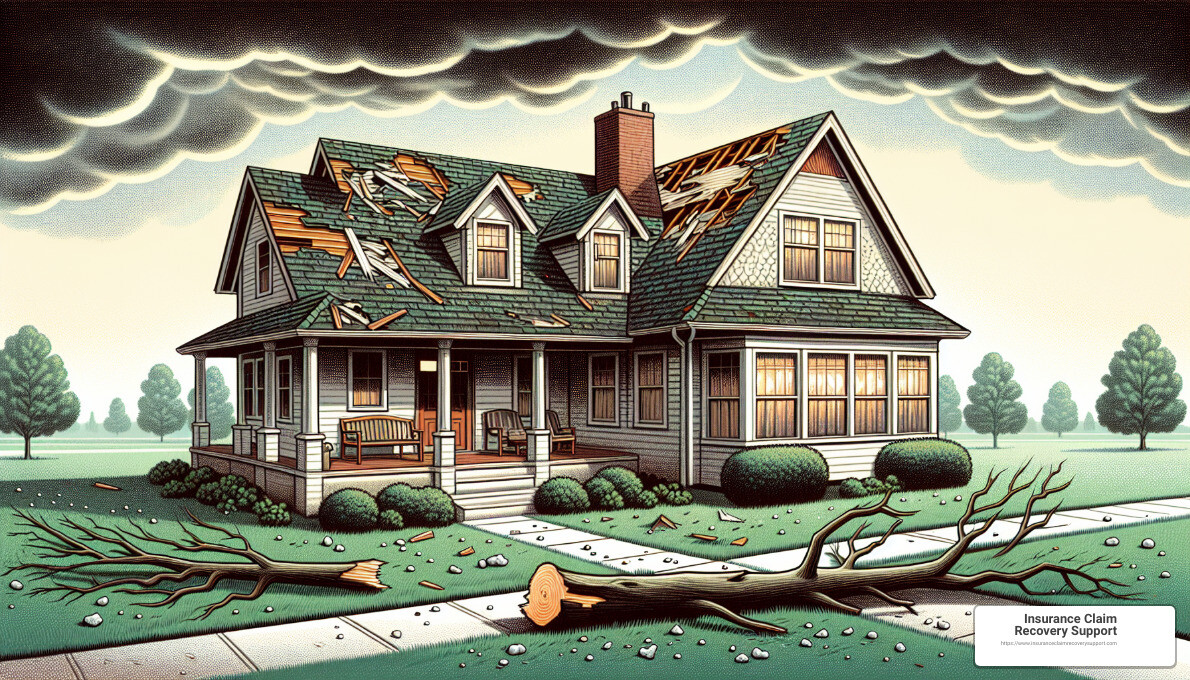Looking to hire an independent home insurance adjuster? Whether you’re dealing with damage caused by natural disasters, or navigating through the complexity of high-value claims, an independent adjuster can be your ally in ensuring a fair and timely settlement. Here’s a quick run-down to give you the foundational understanding right off the bat:
- Independent Home Insurance Adjuster: A professional who evaluates insurance claims on behalf of the insurer but is not an employee of the insurance company. They bring objectivity to the assessment and settlement process.
- Benefits: Offers third-party objectivity, may speed up claim resolution, and has potential to secure fairer settlements.
- Independent vs. Public Adjuster: Independent adjusters are hired by the insurance company while public adjusters are hired by you, the policyholder, to advocate on your behalf.
The world of insurance claims can be complex and frustrating, especially when you’re dealing with considerable property damage across commercial and residential entities like multifamily complexes, schools, or hospitals. Independent insurance adjusters play a crucial role in this ecosystem, serving as a vital bridge between policyholders and insurance companies. Hiring an independent adjuster can bring numerous benefits, including a more objective assessment of damages and potentially a more favorable settlement. However, it’s important to understand the distinction between independent and public adjusters to make the most informed decision for your specific needs.

In short, if you’re a property owner or manager in any capacity, from apartment complexes to schools, and you’ve experienced property damage, an independent insurance adjuster can be a critical ally. They can guide you through the insurance claim process, advocate for your interests, and help alleviate the stress and confusion often associated with large property damage claims.
Recognize When You Need an Independent Adjuster
When disaster strikes or you’re facing significant property damage, it can be a challenging time. Understanding when to call in an independent home insurance adjuster can make all the difference in navigating your claim successfully. Let’s break down the scenarios where enlisting an independent adjuster is a smart move.
Natural Disasters
If your property has been affected by a natural disaster like a hurricane, tornado, flood, or wildfire, the damage can be extensive and overwhelming. Independent adjusters are especially valuable in these situations. They have experience assessing the wide range of damage these events can cause and can help ensure your claim covers all necessary repairs.
Property Damage
Not all property damage is due to catastrophic events. Sometimes, smaller incidents like a burst pipe or a roof leak can cause significant damage. An independent public adjuster can help you navigate these claims, ensuring that even the less obvious damages are accounted for and compensated.
High-value Claims
When the stakes are high, and there’s a lot of money on the line, having an independent adjuster by your side is crucial. They can provide the expertise needed to handle high-value claims, ensuring that you receive a fair settlement that covers your losses fully.
Complex Claims
Some claims are more complicated than others. This could be due to the nature of the damage, disputes with the insurance company, or issues with the policy itself. An independent adjuster has the skills and experience to manage these complexities, acting as a mediator between you and the insurance company and helping to simplify the process for you.
In conclusion, recognizing when you need the services of an independent home insurance adjuster is key to managing your insurance claims effectively. Whether you’re dealing with the aftermath of a natural disaster, navigating high-value or complex claims, or simply need expert guidance on property damage, an independent adjuster can provide the support and expertise you need to secure a fair settlement. They work for you, not the insurance company, ensuring your interests are always front and center.
How to Find a Qualified Independent Home Insurance Adjuster
Finding a qualified independent home insurance adjuster can feel like a daunting task, but it’s crucial for ensuring that you receive a fair assessment and settlement of your insurance claim. Here’s a straightforward guide to help you find the right independent adjuster for your needs.
Licensing Requirements
First off, ensure that any independent adjuster you consider is properly licensed. In Texas, for example, adjusters must comply with specific licensing requirements set by the state. This not only proves their legitimacy but also ensures they are up-to-date with the latest laws and regulations. You can verify an adjuster’s license status through the Texas Department of Insurance or the relevant state authority.
Experience
Experience matters a lot in insurance adjusting. Look for an independent adjuster with a solid track record of handling claims similar to yours. More experienced adjusters are likely to have encountered a variety of claim scenarios and can navigate the complexities of the insurance claim process more effectively.
Specialization
Not all adjusters are created equal. Some specialize in certain types of claims, such as water damage, fire damage, or independent roof adjuster services. If your claim involves specific or unusual circumstances, finding an adjuster with relevant specialization can be highly beneficial.
Local Knowledge
Especially in a state as large and diverse as Texas, local knowledge can be invaluable. An independent adjuster familiar with the Texas regions where your property is located will have a better understanding of local building codes, construction costs, and potential weather-related damages. This insight can significantly impact the accuracy of your claim’s assessment.
Texas Regions
Given the size and geographical diversity of Texas, from the humid Gulf Coast to the arid deserts of West Texas, the specifics of your claim can vary greatly. An independent adjuster who knows the Dallas-Fort Worth area, for example, may not be as effective if your claim is in Houston or San Antonio. When searching, consider adjusters’ familiarity with the specific Texas region where your claim originated.
Finding the right independent home insurance adjuster involves a mix of verifying professional credentials and assessing personal fit. Ensure they are licensed, experienced, and have the specialization and local knowledge that align with your needs. A well-chosen independent adjuster can make a significant difference in the outcome of your insurance claim, guiding you smoothly through the process and helping secure the settlement you deserve. The goal is to work with an adjuster who not only understands the ins and outs of insurance claims but also has a deep understanding of your local area and specific claim type.
Understanding the Costs and Benefits
When considering hiring an independent home insurance adjuster, it’s vital to weigh the costs against the potential benefits. This section will help you understand what you’re investing in and what you can expect in return.
Fee Structures
Most independent adjusters operate on a contingency fee basis. This means they receive a percentage of the settlement amount. The percentage can vary, but it’s typically between 5% to 15%. For example, if your settlement is $100,000 and the adjuster’s fee is 10%, you would pay $10,000 to the adjuster.
No upfront fees mean they are motivated to maximize your settlement. However, it’s crucial to have a clear agreement about the fee structure before hiring an adjuster.
Higher Settlement Likelihood
Statistics and case studies show that policyholders who work with an independent adjuster often receive higher settlements than those who go it alone. Independent adjusters have the expertise to identify damages that policyholders might overlook and to accurately value the claim. They understand the nuances of policy language and can negotiate effectively with insurance companies.
Cost-Benefit Analysis
Before hiring an independent adjuster, conduct a simple cost-benefit analysis. Consider the potential increase in your settlement against the adjuster’s fee. In many cases, even after the fee, policyholders end up with a significantly higher net settlement.
Ask potential adjusters for case studies or examples of how they’ve increased settlements for clients. This can give you a clearer idea of the value they bring to the table.
Negotiation Skills
An independent adjuster’s negotiation skills can be a game-changer in your claim’s outcome. They know how insurance companies operate and what strategies they use to minimize payouts. With an adjuster on your side, you’re equipped with expertise to counter these tactics and push for a fair settlement.
Insurance companies often take claims more seriously when an adjuster is involved, which can lead to quicker and more substantial settlements. The adjuster’s ability to articulate the damages and justify the claim amount can make all the difference.
In Summary, hiring an independent home insurance adjuster involves costs, but the potential benefits – including a higher settlement likelihood and expert negotiation – often outweigh these expenses. By understanding the fee structures, conducting a cost-benefit analysis, and appreciating the value of professional negotiation skills, you can make an informed decision about whether hiring an independent adjuster is the right move for your claim. As you move forward, keep these considerations in mind to ensure you’re making the best decision for your situation.
Preparing for the Adjuster’s Visit
Getting ready for the visit from an independent home insurance adjuster is a crucial step in the claims process. This visit can significantly influence the outcome of your claim. Let’s break down how to prepare effectively:
Documentation
- Gather Evidence: Before the adjuster arrives, compile all possible evidence of the damage. This includes photos and videos taken immediately after the incident. The more detailed your documentation, the better the adjuster can understand the extent of the damage.
- Record Details: Note the date and time of the damage, and any factors that contributed to it. This might include a storm’s impact in Texas, or specific conditions that exacerbated the damage.
Damage Assessment
- Self-Assess: While you’re not an expert, doing a preliminary assessment can help you understand the extent of damage. This will also prepare you for discussions with the adjuster.
- Be Thorough: Don’t overlook minor details. Small signs of damage can indicate larger issues.
Repair Estimates
- Get Multiple Estimates: Before the adjuster’s visit, obtain at least two repair estimates from reputable contractors. These estimates provide a benchmark and can help in negotiations with the insurance company.
- Detail is Key: Ensure these estimates are detailed, breaking down the costs of materials and labor.
Witness Statements
- Collect Statements: If anyone witnessed the incident (neighbors, friends, etc.), their accounts could support your claim. Written statements are preferable.
- Contact Information: Make sure you have the contact details of any witnesses. The adjuster may want to follow up for more information.
Texas-specific Conditions
- Understand Local Impact: Texas’s unique weather conditions, like hurricanes and hailstorms, can affect claims. Be prepared to discuss how these factors influenced the damage.
- Local Regulations: Be aware of any Texas-specific insurance regulations that might affect your claim. Knowledge of these can help ensure the adjuster is considering all relevant information.
Preparing for the adjuster’s visit is about being as informed and ready as possible. By gathering comprehensive documentation, understanding the damage, obtaining repair estimates, and considering Texas-specific conditions, you’re setting the stage for a successful claim process. The goal is to ensure that the damage is accurately assessed so that you can receive the compensation you need to repair or replace your property.
It’s essential to understand how to navigate the claims process with your adjuster effectively. This includes knowing how to submit your claim, reviewing your policy together, negotiating the settlement, and understanding the timelines, especially under Texas insurance laws.
Navigating the Claims Process with Your Adjuster
Navigating the claims process with an independent home insurance adjuster can seem daunting at first. But, with the right approach and understanding, it can be a smooth journey that leads to a fair settlement. Here’s how to do it:
Claim Submission:
The first step is to submit your claim. This might seem straightforward, but it’s crucial to get it right. Your independent adjuster can help ensure that all necessary documentation is in order and that your claim is submitted promptly. The sooner you get this done, the better.
Policy Review:
Next, sit down with your adjuster for a thorough review of your policy. This step is vital because it sets the foundation for your claim. Your independent adjuster will help you understand the specifics of your coverage, including any deductibles, limits, and exclusions. This knowledge is power—it helps you set realistic expectations about what’s covered and what’s not.
Settlement Negotiation:
Negotiating a settlement is where an independent adjuster really shines. They bring experience and negotiation skills to the table, working to get you the best possible settlement. They understand the ins and outs of insurance company tactics and how to counter them effectively. It’s their job to advocate for you, ensuring that the settlement offer is fair and covers your losses.
Understanding Texas Insurance Laws:
Texas has its own set of insurance laws that can affect your claim. Your independent adjuster is familiar with these laws and how they apply to your situation. For example, Texas has specific deadlines for insurance companies to acknowledge, process, and settle claims. Knowing these laws helps your adjuster keep the insurance company accountable, ensuring that your claim is handled within the legal timeframes.
Timelines:
Understanding the timeline of your claim process is crucial. Your adjuster can give you a realistic timeline, from claim submission to settlement. However, each claim is unique, and various factors can affect how long the process takes. Your adjuster will keep you informed at every step, ensuring that you know what to expect and when to expect it.
Navigating the claims process with an independent adjuster by your side can make a significant difference in the outcome of your claim. They guide you through each step, from submission to settlement, ensuring that your rights are protected under Texas insurance laws. With their expertise, you can navigate the claims process confidently, knowing that you have a professional advocate working for your best interests.
As we’ve explored the steps to navigate the claims process, it’s clear that having an expert by your side can make all the difference. Let’s move on to discuss the essential questions you should ask before hiring an independent home insurance adjuster to ensure you’re making the best choice for your needs.
Essential Questions to Ask Before Hiring
Hiring an independent home insurance adjuster is a critical step in managing your insurance claim effectively. To ensure you choose the right independent adjuster for your needs, especially in Texas, here are some essential questions to ask:
Experience in Texas
- How long have you been working as an independent adjuster in Texas?
Texas has its unique challenges and insurance laws. An adjuster with local experience will navigate these efficiently.
Success Rates
- Can you share your success rates with similar claims?
Knowing their track record can give you confidence in their ability to secure a favorable outcome for your claim.
References
- Do you have any client references?
Real feedback from past clients can provide insight into the adjuster’s effectiveness and professionalism. A reputable independent adjuster should be happy to share references.
Communication Process
- How will you keep me updated throughout the process?
Regular updates are crucial. Ensure their communication style matches your expectations.
Handling Disputes
- How do you handle disputes with insurance companies?
Disputes can arise during the claims process. It’s important to know how the adjuster plans to advocate on your behalf.
Asking these questions will help you gauge whether an independent home insurance adjuster is the right fit for your claim. The goal is to find an adjuster who is well-equipped to navigate the complexities of your claim, ensuring a fair settlement.
Conclusion
After delving into the intricate process of hiring an independent home insurance adjuster, it’s evident how crucial their role can be in navigating the complexities of insurance claims. Whether it’s dealing with the aftermath of a natural disaster, addressing significant property damage, or untangling the complexities of a high-value claim, an independent adjuster can be your advocate, ensuring that you receive the fair settlement you deserve.
At Insurance Claim Recovery Support LLC, we understand the challenges and emotional toll that can accompany filing a claim. That’s why we’re dedicated to standing by your side every step of the way. Our team of experienced professionals is here to provide the expertise, advocacy, and support you need to navigate the claims process smoothly and efficiently.
Why Choose Us?
-
Expertise: Our team is well-versed in all aspects of the claims process, from documentation and damage assessment to policy review and settlement negotiation. We bring a wealth of knowledge and experience to the table, ensuring no detail is overlooked.
-
Advocacy: As your advocate, we’re committed to fighting for your best interests. We understand the tactics insurance companies may use and are prepared to negotiate aggressively on your behalf.
-
No Upfront Cost: Our services are offered on a contingency basis. This means we only get paid when you do, aligning our success with yours and providing peace of mind during a potentially stressful time.
Choosing the right independent home insurance adjuster can make all the difference in your claim’s outcome. At Insurance Claim Recovery Support LLC, we pride ourselves on our track record of success and our commitment to our clients. We’re not just a service provider; we’re your partner in recovery.
Navigating insurance claims doesn’t have to be a daunting task. With the right support and expertise, you can achieve a successful settlement and move forward with confidence. Contact us today for a free case review and take the first step towards a brighter future.
When it comes to your property and your insurance claim, you don’t have to navigate it alone. Let us help you rebuild, recover, and restore your peace of mind.









